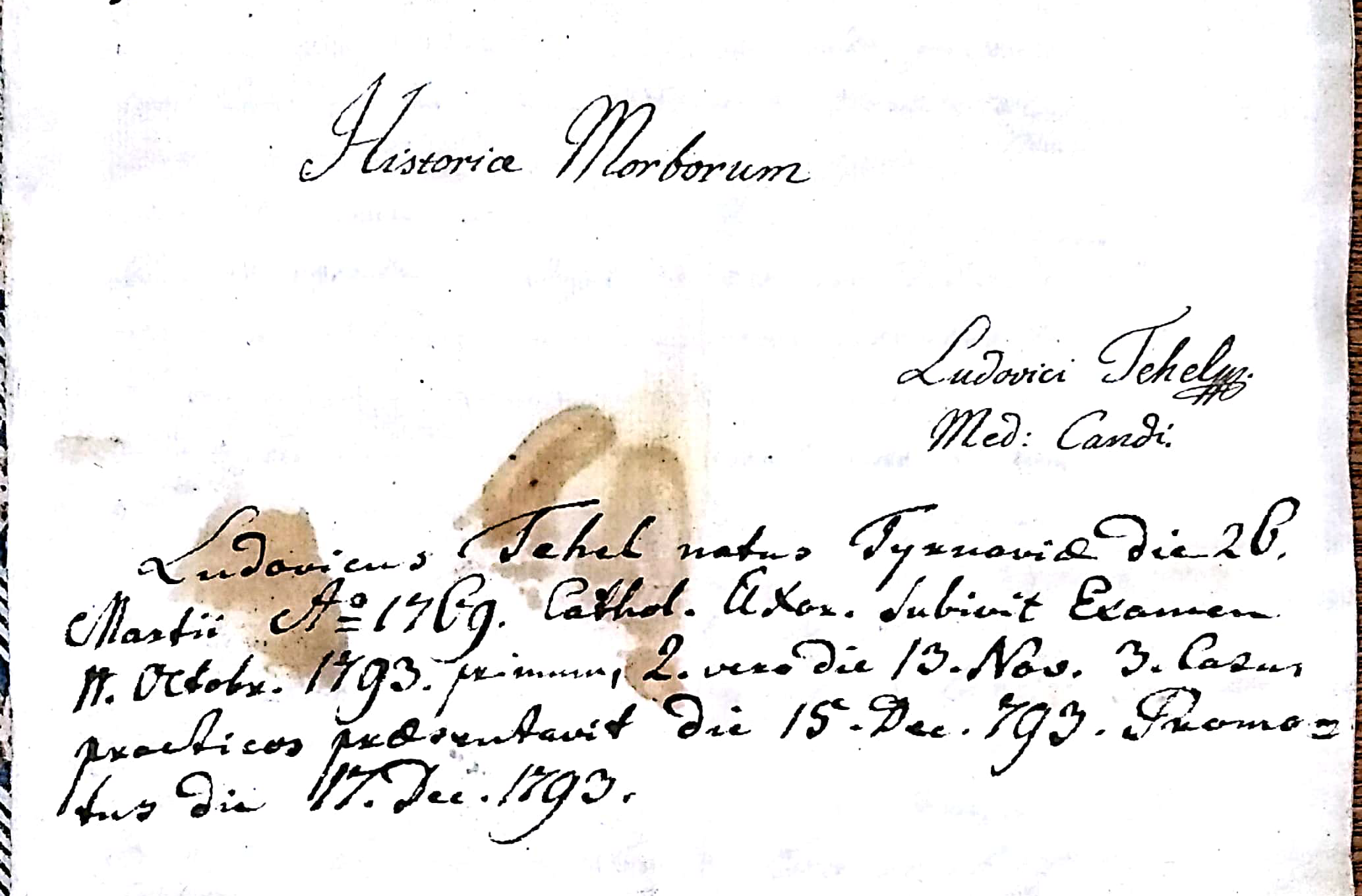The Disease of the Soma or the Psyche?
The Interpretations of Madness in the Medical Case Histories of the University of Pest in the Early Nineteenth Century
DOI:
https://doi.org/10.15170/PAAA.2022.09.02.05.Keywords:
psychiatry, case history, university, clinic, mental asylumAbstract
The article examines a previously uncharted territory of medical history in Hungary, the early history of psychology and psychiatry in an age which lacked the appropriate institutional means to isolate and care for the mentally ill. Nevertheless, there were increasing efforts to find a place for those afflicted with different mental maladies within the developing system of healthcare from the second half of the eighteenth century. As the remaining sources testify, several of them were taken to the teaching clinic of the University of Pest, where medical students were expected to take detailed case histories, in which they recorded the anamnesis, the current status of the patient, a diagnosis, the progress, and the possible outcome of the disease. This relatively large body of materials
offers us a unique glimpse into how mental illnesses were identified, perceived, and treated in early nineteenth-century Hungary.
By looking at the formalized and standardized practices of case history writing from a comparative perspective, examining sources from the teaching clinics of the universities of Pest and Edinburgh, as well as the mental asylums in Vienna, Prague, and York, the paper attempts to reconstruct the physicians’ gaze and the patients’ perspective and decode how madness was approached and understood in medical practice.
Downloads
References
Aaslestad, Petter: The Patient as Text: The Role of the Narrator in Psychiatric Notes, 1890–1990. Oxford, 2009.
Andrews, Jonathan: Case Notes, Case Histories, and the Patient’s Experience of Insanity at Gartnavel Royal Asylum, Glasgow, in the Nineteenth Century. Social History of Medicine 11. (1998):2. 255–281. ǁ [DOI] https://doi.org/10.1093/shm/11.2.255 ǁ [Google Scholar] https://tinyurl.com/yw3bh4td
Andrews, Jonathan – Scull, Andrew: Customers and Patrons of the Mad-Trade: The Management of Lunacy in Eighteenth-Century London, With the Complete Text of John Monro’s 1766 Case Book. Berkeley – Los Angeles – London, 2002.
Bacopoulos-Viau, Alexandra – Fauvel, Aude: The Patient’s Turn. Roy Porter and Psychiatry’s Tales, Thirty Years On. Medical History 60. (2016):1. 1–18. ǁ [DOI] https://doi.org/10.1017/mdh.2015.65 ǁ [Google Scholar] https://tinyurl.com/475k68hu
Little Tools of Knowledge: Historical Essays on Academic and Bureaucratic Practices. Eds. Becker, Peter – Clark, William. Ann Arbor, 2001.
Berkenkotter, Carol: Patient Tales. Case Histories and the Uses of Narrative in Psychiatry. Columbia, 2008.
Blair, Ann: Reading Strategies for Coping with Information Overload, ca. 1550–1700. Journal of the History of Ideas 64. (2003):1. 11–28. ǁ [DOI] https://doi.org/10.1353/jhi.2003.0014 ǁ [Google Scholar] https://tinyurl.com/76uffxuc
Borgos Anna: A megtestesült trauma. Hisztériás betegek huszadik század eleji kórrajzok tükrében. In: Határtalan nők. Kizártak és befogadottak a női társadalomban. Szerk. Bakó Boglárka – Tóth Eszter Zsófia. Budapest, 2008. 382–393.
Condrau, Flurin: The Patient’s View Meets the Clinical Gaze. Social History of Medicine 20. (2007):3. 525–540. ǁ [DOI] https://doi.org/10.1093/shm/hkm076 ǁ [Google Scholar] https://tinyurl.com/26fvtraa
Craig, Stephen C.: “Enquire into All the Circumstances of the Patient Narrowly”: John Rutherford’s Clinical Lectures in Edinburgh, 1749–1753. Journal of the History of Medicine and Allied Sciences 72. (2017):3. 302–327. ǁ [DOI] https://doi.org/10.1093/jhmas/jrx017 ǁ [Google Scholar] https://tinyurl.com/y322hwwz
Daston, Lorraine: Taking Note(s). Isis 95. (2004):3. 443–448. ǁ [DOI] https://doi.org/10.1086/428963 ǁ [Google Scholar] https://tinyurl.com/5fpe72dx
Daston, Lorraine: The Empire of Observation. In: Histories of Scientific Observation. Eds. Daston, Lorraine – Lunbeck, Elizabeth. Chicago, 2011. 82–113. ǁ [DOI] https://doi.org/10.7208/chicago/9780226136790.001.0001 ǁ [Google Scholar] https://tinyurl.com/yeywj7nm
Digby, Anne: Madness, Morality and Medicine: A Study of the York Retreat, 1796–1914. New York, 1985. [Google Scholar] https://tinyurl.com/4svr4wyy
Foucault, Michel: A pszichiátriai hatalom: a kikérdezés, a drog és a hipnózis (1974. január 31-i előadás a Collège de France-ban). Ford. Takács Ádám. In: Drogpolitika, hatalomgyakorlás és társadalmi közeg. Elemzések foucault-i perspektívából. Szerk. Rácz József – Takács Ádám. Budapest, 2006. 145–161.
Frank Tibor: A pszichiátriai kórrajz mint történeti forrás. Világosság 19. (1978):4. 239–247.
Geyer-Kordesch, Johanna: Comparative Difficulties: Scottish Medical Education in the European Context (c. 1690–1830). In: The History of Medical Education in Britain. Eds. Nutton, Vivian – Porter, Roy. Amsterdam – Atlanta 1995. 94–115. ǁ [DOI] https://doi.org/10.1163/9789004418394_008 ǁ [Google Scholar] https://tinyurl.com/29nzfuem
Goody, Jack: The Logic of Writing and the Organisation of Society. Cambridge, 1986. ǁ [DOI] https://doi.org/10.1017/CBO9780511621598 ǁ [Google Scholar] https://tinyurl.com/2f4y2djm
Gyáni Gábor: A pszichohistória-írás magyar fejleményei. In: Aranyhíd. Tanulmányok Keszeg Vilmos tiszteletére. Szerk. Jakab Albert Zsolt – Vajda András. Kolozsvár, 2017. 135–144.
Patient Voices in Britain, 1840–1948. Eds. Hanley, Anne – Meyer, Jessica. Manchester, 2021.
Hess, Volker: Formalisierte Beobachtung. Die Genese der modernen Krankenakte am Beispiel der Berliner und Pariser Medizin (1725–1830). Medizinhistorisches Journal 45. (2010):3–4. 293–340. ǁ [DOI] https://doi.org/10.25162/medhist-2010-0011 ǁ [Google Scholar] https://tinyurl.com/2fdw6m6j
Hess, Volker – Ledebur, Sophie: Taking and Keeping: A Note on the Emergence and Function of Hospital Patient Records. Journal of the Society of Archivists 32. (2011):1. 21–33. ǁ [Google Scholar] https://tinyurl.com/yc4w9e4d ǁ [WoS] https://www.webofscience.com/wos/woscc/full-record/WOS:000293452200003
Hess, Volker – Mendelsohn, Andrew J.: Case and Series: Medical Knowledge and Paper Technology, 1600–1900. History of Science 48. (2010):3–4. 287–314. ǁ [DOI] https://doi.org/10.1177/007327531004800302 ǁ [Google Scholar] https://tinyurl.com/26cya3f2 ǁ [WoS] https://www.webofscience.com/wos/woscc/full-record/WOS:000281824800002
Hurwitz, Brian: Form and Representation in Clinical Case Reports. Literature and Medicine 25. (2006):2. 216–240. ǁ [DOI] https://doi.org/10.1353/lm.2007.0006 ǁ [Google Scholar] https://tinyurl.com/4dn8kfxc
Ingram, Allen: The Madhouse of Language: Writing and Reading Madness in the Eighteenth Century. London, 1991. ǁ [Google Scholar] https://tinyurl.com/pb3tcs98
Kennedy, Margaret Ann: A Curious Literature: Reading the Medical Case History from the Royal Society to Freud. PhD thesis. Brown University, 2000.
Kovai Melinda: Politika, hatalom és tudás a Kádár-korszak pszichiátriai kórrajzain. Doktori értekezés, Pécsi Tudományegyetem, 2010. (https://pea.lib.pte.hu/bitstream/handle/pea/15219/kovai-melinda-phd-2011.pdf?sequence=1&isAllowed=y) [2022.03.30.] ǁ [Google Scholar] https://tinyurl.com/3t3thnp9
Kövér György: Hysteriától a tébolyodottságig. Klára és Emma párhuzamos esettörténete. Korall 21–22. (2005):2. 68–96.
Krász Lilla: Az adatoktól az információig, az információtól a tudástermelésig: Az egészségügyijelentés-írás gyakorlata(i) a XVIII. századi Magyarországon. Századvég 70. (2013) 155–187.
Krász Lilla: Theoria medica és praxis medica: A tudásközvetítés változó útjai a medicinában a 18. század második felében. Századok 151. (2017):5. 1025–1042.
Krász Lilla: Táblázatokba zárt tudás? Az orvosi tudásszervezés gyakorlatai a 18. századi Magyarországon. Kaleidoscope 13. (2018) 223–250. ǁ [Google Scholar] https://tinyurl.com/2n2hkndb
Krász Lilla: ’Observing to describe, describing to observe’: The Epistemic Turn of Medical Writing in the 18th Century. Hungarian Studies 33. (2019) 175–184. ǁ [DOI] https://doi.org/10.1556/044.2019.33.1.12 ǁ [Google Scholar] https://tinyurl.com/27fhpa4t
Lafferton Emese: A magántébolydától az egyetemi klinikáig. A magyar pszichiátria történetének vázlata európai kontextusban, 1850–1906. In: A kreativitás mintázatai. Szerk. Békés Vera. Budapest, 2004. 34–72.
Lafferton Emese: Halált hozó hipnózis. Egy 1894-es eset és a tudomány mentális földrajza. Korall 21–22. (2005):2. 46–67.
Mendelsohn, Andrew J.: Empiricism in the Library. In: Science in the Archives: Pasts, Presents, Futures. Ed. Daston, Lorraine. Chicago, 2017. 85–109. ǁ [DOI] https://doi.org/10.7208/chicago/9780226432533.003.0003 ǁ [Google Scholar] https://tinyurl.com/m7n73zur
Montgomery Hunter, Kathryn: Doctor’s Stories: The Narrative Structure of Medical Knowledge. Princeton, 1991. ǁ [DOI] https://doi.org/10.1515/9780691214726
Pomata, Gianna: Sharing Cases: The Observationes in Early Modern Medicine. Early Science and Medicine 15. (2010):3. 193–236. ǁ [DOI] https://doi.org/10.1163/157338210X493932 ǁ [Google Scholar] https://tinyurl.com/ufu5s2m6
Porter, Roy: The Patient’s View. Doing Medical History from Below. Theory and Society 14. (1985): 2. 175–98. ǁ [DOI] https://doi.org/10.1007/BF00157532 ǁ [Google Scholar] https://tinyurl.com/yc23zxwz
Rédei Ildikó: Historiae morborum: Kórtörténetek a 18–19. századból. Budapest, 2016.
Reaume, Geoffrey: From the Perspectives of Mad People. In: The Routledge History of Mental Health. Ed. EGHIGIAN, Greg. London, 2017. 277–296. ǁ [DOI] https://doi.org/10.4324/9781315202211-16 ǁ [Google Scholar] https://tinyurl.com/3w9kdd7b
Risse Guenter B.: Hospital Life in Enlightenment Scotland: Care and Teaching at the Royal Infirmary of Edinburgh. Cambridge, 1986. ǁ [Google Scholar] https://tinyurl.com/5yhusxe6
Risse, Guenter B.: Clinical Instruction in Hospitals: The Boerhaavian Tradition in Leyden, Edinburgh, Vienna and Pavia. Clio Medica 21. (1987):1–4. 1–19. ǁ [DOI] https://doi.org/10.1163/9789004418301_003 ǁ [Google Scholar] https://tinyurl.com/bddcj5zr
Scheutz, Martin – Weiss, Alfred Stefan: Spitäler im bayerischen 2008 und österreichischen Raum in der Frühen Neuzeit (bis 1800). In: Europäisches Spitalwesen. Institutionelle Fürsorge in Mittelalter und Früher Neuzeit / Hospitals and Institutional Care in Medieval and Early Modern Europe. Eds./Hg. Scheutz, Martin – Sommerlechner, Andrea – Weigl, Herwig – Weiss, Alfred Stefan. Wien – München, 2008. 185–229. ǁ [DOI] https://doi.org/10.7767/boehlau.9783205160885.185 ǁ [Google Scholar] https://tinyurl.com/ymcx6n4s
Watzka, Carlos: Vom Hospital zum Krankenhaus: zum Umgang mit psychisch und somatisch Kranken im frühneuzeitlichen Europa. Köln – Wien, 2005. ǁ [Google Scholar] https://tinyurl.com/38xr337d
Watzka, Carlos: Arme, Kranke, Verrückte: Hospitäler und Krankenhäuser in der Steiermark vom 16. bis zum 18. Jahrhundert und ihre Bedeutung für den Umgang mit psychisch Kranken. Graz, 2007. ǁ [Google Scholar] https://tinyurl.com/sx6f8nzc

Downloads
Published
How to Cite
Issue
Section
License
Copyright (c) 2023 Per Aspera ad Astra

This work is licensed under a Creative Commons Attribution-NonCommercial-NoDerivatives 4.0 International License.










